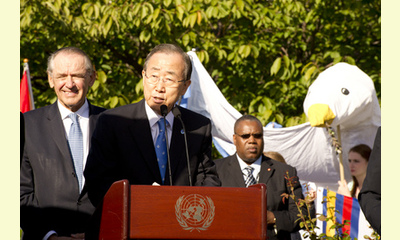|
|
Secretary-General's Remarks at UN Culture of Peace Debate
un articulo por UN News
Following are UN Secretary-General Ban Ki-moon’s remarks to the high-level debate on the culture of peace and non-violence, in New York, 21 September:
Thank you for attending this important high-level debate. I am especially grateful to UNESCO [United Nations Educational, Scientific and Cultural Organization] Director-General Irina Bokova for bringing us all together.

Secretary-General Ban Ki-moon speaks at the annual Peace Bell Ceremony. UN Photo/Eskinder Debebe
click on photo to enlarge
This meeting on a culture of peace comes at a time when extremists and bigots are trying to stoke a culture of prejudice and violence. They are dividing people, exploiting fears and spreading malice.
Freedom of speech is guaranteed in the Universal Declaration of Human Rights. The freedom to assemble peacefully is also fundamental. But neither of these essential freedoms is a license to incite or commit violence. The bloodshed and unrest are deplorable and unjustifiable.
I can well imagine why people would want to peacefully express their anguish against this reprehensible film. Its message is utterly repugnant — and I know people of goodwill around the world feel the same way.
Our challenge and our duty is to deny those who want to sow hatred precisely what they seek — more hatred, more attacks and more division. A violent response only plays into the hands of those who wish to perpetuate the cycle of bias and recrimination. We cannot let the voices of extremists dominate the debate and inflame tensions. We need voices of moderation and solidarity, reason and respect — especially from religious and political leaders.
That is why this high-level debate is so important. You are speaking out for a culture of peace. More than ever, peace requires dialogue across societies, greater sharing among cultures and better communication with others. I urge this Assembly to combat misunderstandings by promoting common understanding based on the values of the United Nations.
I will also carry this message. I began today by ringing the Peace Bell. I addressed a student youth conference. I met with global Messengers of Peace and Goodwill Ambassadors. At each of these events, I denounced violence and called for a culture of peace. This is my job as Secretary-General and my conviction as a member of our human family.
All of us who believe in fostering a culture of peace and non-violence have to spread the word among people who we know and to those who we have never met. We have to multiply our efforts through social media. And we have to be relentless in standing for our values — peace, human rights and respect for all people. The world faces too many problems to let divisiveness disrupt our shared work for common progress.
I count on you to give power to this debate for a culture of peace and non-violence so its themes echo next week at our General Assembly General Debate and beyond — in the halls of the United Nations and around the world.
Thank you for your commitment.
|








|
DISCUSSION
Pregunta(s) relacionada(s) al artículo :
What is the United Nations doing for a culture of peace?,
* * * * *
Comentario más reciente:
:
Following the Second High Level Forum of the United Nations on the Culture of Peace, Anwarul Chowdhury, a former Under-Secretary General of the UN, had this to say about what the UN is doing for a culture of peace. His remarks were published by the Independent European Daily Express.
Civil society worldwide has been in the forefront of the global movement for the culture of peace, working diligently and patiently at the grassroots level, he said.
"I find it is the governments and power structures which are the most persistent foot-draggers with regard to advancing the culture of peace through policy steps and action," said Chowdhury, a former U.N. under-secretary-general and currently representing civil society and the Global Movement for the Culture of Peace. . .
The United Nations, he pointed out, has shown great vision by adopting its historic, norm-setting Declaration and PoA on the Culture of Peace in 1999, but has not been organised enough in making the document a system-wide flagship effort of the world body.
"I am a believer that the world, particularly the governments, will come to realise its true value and usefulness sooner than later," Chowdhury said.

|
|









